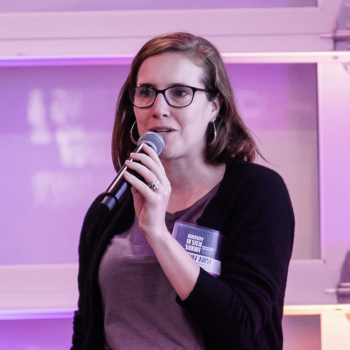
Amy Hurst
Professor of Occupational Therapy and Integrated Digital Media; Director of Ability Project
Occupational Therapy
Amy Hurst is an Associate Professor with a joint appointment in the Department of Occupational Therapy in the Steinhardt School of Culture, Education and Human Development and the Department of Technology, Culture and Society in the Tandon School of Engineering. She is the director of the Ability Project, an interdisciplinary research space dedicated to the intersection between disability and technology. Dr. Hurst received her M.S. and Ph.D. in Human-Computer Interaction from the HCII at Carnegie Mellon and a B.S. in Computer Science from the Georgia Institute of Technology.
She is passionate about understanding current social problems and identifying opportunities for technology to empower individuals impacted by those problems. She uses qualitative methods to analyze a current environment, design and build technology that fits within the constraints of that environment, and evaluate this technology in situ with target users. Her work sits at the intersection of assistive technology, interaction design, and engineering education.
Selected Publications
- William Payne, Fabiha Ahmed, Michael Gardell, R. Luke DuBois, and Amy Hurst. 2022. SoundCells: designing a browser-based music technology for braille and print notation. In Proceedings of the 19th International Web for All Conference (W4A '22). Association for Computing Machinery, New York, NY, USA, Article 14, 1–12. (Best Paper Technical Award Winner).
- Race, Lauren, Charlotte Martin, Xinwen Xu, Cheryl Fogle Hatch, and Amy Hurst. 2021. "Bring Your Own (Accessible) Device: A Mobile Guide Solution for Promoting Accessibility, Social Distancing, and Autonomy in Museums." The International Journal of the Inclusive Museum 15 (2): 1-23.
- Claire Kearney-Volpe and Amy Hurst. 2021. Accessible Web Development: Opportunities to Improve the Education and Practice of web Development with a Screen Reader. ACM Transactions on Accessible Computing 14, 2, Article 8 (June 2021), 32 pages.
- Lauren Race, Joshua Miele, Chancey Fleet, Tom Igoe, and Amy Hurst. 2020. Putting Tools in Hands: Designing Curriculum for a Nonvisual Soldering Workshop. In Proceedings of the 22nd International ACM SIGACCESS Conference on Computers and Accessibility (ASSETS '20). Association for Computing Machinery, New York, NY, USA, Article 78, 1–4.
- Veronica Alfaro Arias, Amy Hurst, and Anita Perr. 2020. Designing a Remote Framework to Create Custom Assistive Technologies. In Proceedings of the 22nd International ACM SIGACCESS Conference on Computers and Accessibility (ASSETS '20). Association for Computing Machinery, New York, NY, USA, Article 62, 1–4.
- Jennifer Mankoff, Megan Hofmann, Xiang 'Anthony' Chen, Scott E. Hudson, Amy Hurst, and Jeeeun Kim. 2019. Consumer-grade fabrication and its potential to revolutionize accessibility. Communications of the ACM 62, 10 (October 2019), 64–75.
